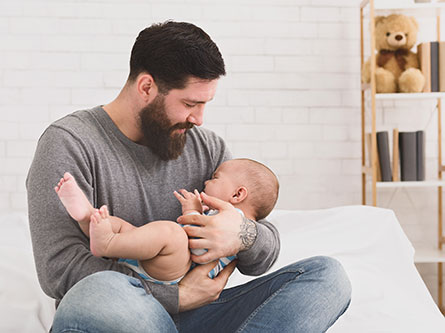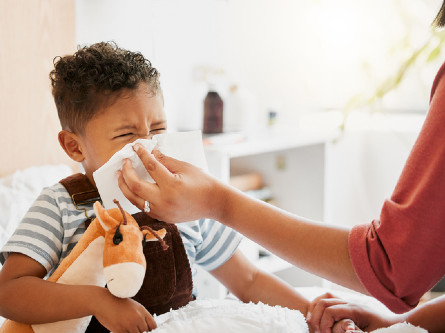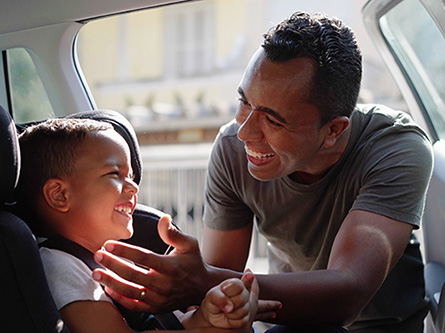Respiratory syncytial virus, commonly known as RSV, is making headlines lately. Pediatricians across the nation are seeing an increase in the number of children sick with RSV. Many say the uptick in cases is likely because people weren’t exposed much in the past two years with masking and social distancing during the COVID-19 pandemic.
Here’s some information for parents to help protect children from RSV and to know the first signs of severe infection.
What is RSV?
RSV is an infectious disease that can be serious in young children, especially those under the age of 1. It can cause bronchiolitis, an inflammation of the lower airways, and pneumonia, an infection of the lungs. Most children will get an RSV infection by the time they are 2 years old, according to the Centers for Disease Control and Prevention (CDC).
Learn more about bronchiolitis from our pediatric emergency medicine physicians
What are early symptoms of RSV?
RSV may not be very noticeable when it first shows up. Early symptoms of RSV include:
- Runny nose
- Decrease in appetite
- Cough, which may turn into wheezing
What are the more concerning or severe signs of RSV?
Severe symptoms of RSV in children will show up if they get pneumonia or bronchiolitis. They may have the following:
- Wheezing or difficulty breathing
- Breathing very fast
- Possibility that the child’s ribs stick out because they’re taking such deep breaths
- Turning blue around the lips
If you see your child with any of these symptoms, they could be quite severe. It’s recommended that you call your child’s pediatrician immediately.
Learn more about when you should call your child’s doctor for RSV symptoms
What are the differences between RSV symptoms and COVID-19 symptoms in children?
Children with RSV or COVID-19 may experience similar symptoms of runny nose, cough, and fever. However, RSV leads to more wheezing than COVID-19. People with COVID-19 tend to have more abdominal symptoms like vomiting and diarrhea compared to RSV infection.
Learn how to get your children vaccinated against COVID-19
How does RSV spread?
RSV is contagious and can be spread by sneezing or coughing, or by contaminated material that contacts the mouth or eyes. RSV can live for several hours on hard surfaces such as tables and crib rails. It typically lives for a shorter amount of time on soft surfaces like hands and blankets.
Who is likely to have the most severe reaction to RSV?
The youngest children, typically those under 1 year old, are at risk for severe symptoms of RSV. It can cause infection of their lower respiratory tract. Children tend to experience symptoms not just in their nose and mouth, but also the lungs, where RSV can cause an infection. This is what can lead to wheezing, or pneumonia or bronchiolitis. About 1% of all children with RSV infection are admitted to the hospital because of RSV.
Adults can get RSV, but it shows up as more of a cold with a few days of a cough, sneezing, and a runny nose. Older adults and those with chronic medical conditions can have more severe symptoms of RSV.
Learn about RSV in adults from our infectious disease specialist
Are there treatments for RSV?
Antibiotics and antivirals do not work in combating RSV. Medical treatment for RSV is to help relieve the symptoms. This means doctors work to make sure the patient is getting enough oxygen and fluids so that they don’t get dehydrated. Depending on the severity, therapy may include intravenous (IV) fluids to prevent dehydration or supplementary oxygen.
Is there a vaccine for RSV?
There is no vaccine against RSV. Monoclonal antibody prevention is available for some babies at high risk for severe infection.
How can parents protect children from RSV?
RSV is so common that everyone is exposed to it. If someone in your household has RSV, it’s difficult to prevent everybody from being exposed.
Here are a few things you can do to protect your children from RSV:
- Avoid being around anyone who is sick.
- Wash your hands and your child’s hands often for at least 20 seconds each time.
- Clean and disinfect surfaces that people frequently touch, like doorknobs or mobile devices.
- Cover your coughs and sneezes.
See why health experts are warning of a 'tripledemic' this winter




